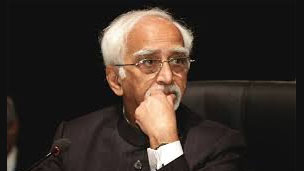Vice President Hamid Ansari voiced concern over the larger systemic issues like paid news and cross-media ownership as they affect the media’s objectivity and credibility.
Pointing out some “disconcerting developments” in the media sector, including diverting attention from real issues to non-issues, Vice President Hamid Ansari voiced concern over the larger systemic issues like paid news and cross-media ownership as they affect the media’s objectivity and credibility.
Addressing an event organised by the Press Council of India to mark the National Press Day, the vice president said the media, besides diverting attention to non-issues, “often divides the people and at times promotes superstition”.
“In relation to economic liberalisation in the post-1991 period, the mainstream media has generally adopted a laudatory tone and tended to underplay its negative socio-economic effects, though of course there have been excellent exceptions. The need for presenting a more balanced picture is essential,” he said.
“There are also larger systemic issues that need to be considered as they directly affect the media’s objectivity and credibility. These relate to cross-media ownership, the phenomena of “paid news”, media ethics and need for effective and viable self-regulatory mechanisms, the decreasing role of editors and their editorial freedom, and the need to improve the working condition of media personnel, including their safety and security. Each of these is the subject of vigorous on-going debate. There is an imperative need to put in place the required correctives,” Ansari said.
Information and Broadcasting Minister Manish Tewari said on the occasion of National Press Day, there was need to “rededicate ourselves to the cause of empowering the working journalist as well as creating the necessary wherewithal that supports truly independent media initiatives”.
He said “corporate ownership of the media is an inescapable reality as is surrogate political ownership as well as government ownership in the public broadcaster format”. He said the challenge is “to always try and find the elusive golden mean so that public interest does not become a permanent casualty at the altar of competing and contradictory private interests”.
He also said after the Leveson inquiry, on the culture, practices and ethics of the British press following the News International phone hacking scandal, Britain had promulgated a royal charter on media regulation overcoming opposition by powerful interests in the British media industry.
“Unfortunately this development has not found resonance in the otherwise vacuous realm of public polemics in our country,” he said.
– IANS





